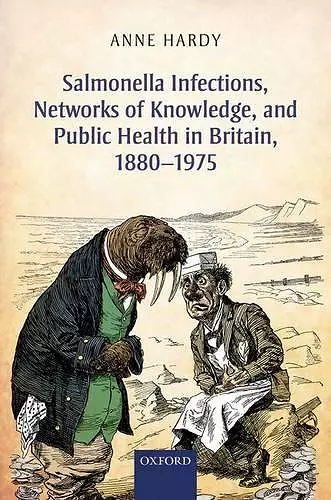Salmonella Infections, Networks of Knowledge, and Public Health in Britain, 1880-1975
Format:Hardback
Publisher:Oxford University Press
Published:11th Dec '14
Currently unavailable, and unfortunately no date known when it will be back

Salmonella infections were the most significant food poisoning organisms affecting human and animal health across the globe for most of the twentieth century. In this pioneering study, Anne Hardy uncovers the discovery of food poisoning as a public health problem and of Salmonella as its cause. She demonstrates how pathways of infection through eggs, flies, meat, milk, shellfish, and prepared foods were realised, and the roles of healthy human and animal carriers understood. This volume takes us into the world of the laboratories where Salmonella and their habits were studied - a world with competing interests, friendships, intellectual agreements and disagreements - and describes how the importance of different strains of these bacteria and what they showed about agricultural practices, global trade, and modern industrial practices came to be understood. Finally, Hardy takes us from unhygienic practice on fields and farms, to crucial sites of bacterial exchange in slaughterhouse and kitchen, where infections like Salmonella and Campylobacter enter the human food chain, and where every cook can make the difference between well-being and suffering in those whom they feed. This history is based on a case-study of the British experience, but it is set in the context of today's immense global problem of food-borne disease which affects all human societies, and is one of the most urgent and important problems in global public health.
will deservedly become a standard text for historians of late 19th- and early 20th-century public health in Britain. The narrative reveals the uneven, yet revolutionary impact of bacteriology on epidemiology and public health practice and sets events in Britain in a transnational context. The book is a must too for social historians, as it offers fascinating and novel insights into domestic life, through what food was brought into the home, how it was prepared and eaten, and how, too often, it had unwanted consequences. * Professor Michael Worboys, Reviews in History *
[a] fascinating book ... I strongly recommend this book, which will be of interest to scholars specialising in the history of microbiology, the laboratory, international and national disease control and the history of food. * James Hanley, Social History of Medicine *
Salmonella Infections is to be commended for tackling such a wide-ranging topic ... Hardy is deft at moving from local to global, from national to international, and from the sites of knowledge production to their circulation and contestation. These are themes for which historians of medicine have been clamoring of late, and Hardy's work sets the stage for a wealth of future research. * Jacob Steere-Williams, Journal of the History of Medicine and Allied Sciences *
Anne Hardy provides a unique overview of Salmonella's rise as a modern health hazard and of the concomitant development of microbiology, epidemiology and public health ... Hardy provides a lucid tour de force through the history of Salmonella, microbiology, public health and food production. Her book's structure works very well in fusing these diverse histories into an insightful narrative. Readers are given a fascinating and important introduction not only to the world of Salmonella but also to the laboratories which illuminated this world. * Claas Kirchhelle, English Historical Review *
- Winner of Winner of the 2016 BSHS John Pickstone Prize.
ISBN: 9780198704973
Dimensions: 240mm x 162mm x 22mm
Weight: 564g
260 pages